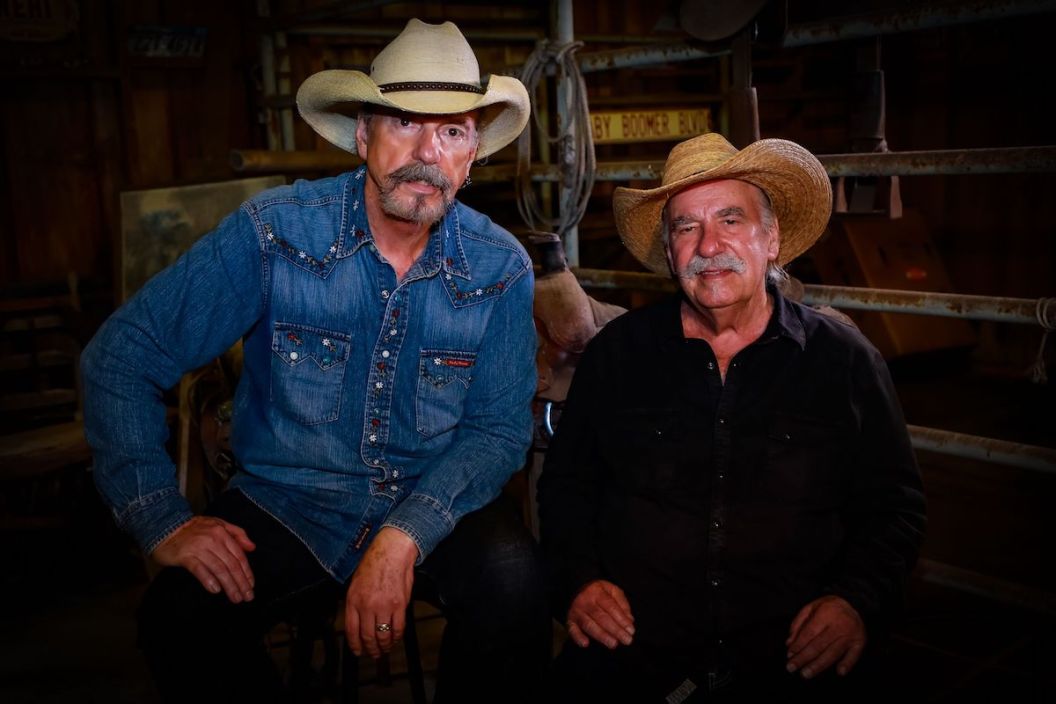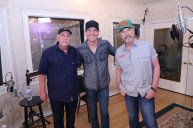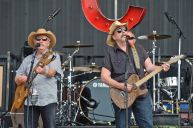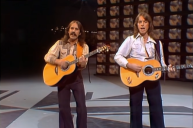Veteran country music duo The Bellamy Brothers interpret popular songs spanning its members' formative listening years and their stretch of chart dominance on recent release Covers From The Brothers.
Videos by Wide Open Country
The new album's tracklist ranges from Joe South's 1968 classic "Games People Play," a song the brothers played in bar bands early in their careers, to Stevie Wonder's timeless 1984 hit "I Just Called to Say I Love You." There's also a collaborative version of Billy Swan's 1974 crossover smash "I Can Help" featuring actor and like-minded musician Dennis Quaid. Each selection sticks to the siblings' harmony-driven blend of country twang and pop accessibility without diluting the source material.
Siblings Howard and David Bellamy chatted with Wide Open Country in October about covering their favorites from the golden age of pop and country songwriting, understanding the science behind The Everly Brothers' blood harmonies and collaborating with Blake Shelton's not-so-secret weapon: award-winning fiddler Jenee Fleenor.
(This interview has been edited for length and clarity.)
Wide Open Country: That cover of 'The Most Beautiful Girl' that starts the album really sticks out to me. I think you guys did a good job with it. It's in your wheelhouse, too, and it could've been a big song for you back in the day. Do you wish you'd had it first?
Howard Bellamy: Norro Wilson, the co-writer of that song, was a great friend of ours. During that time period, I was traveling the road with Jim Stafford, and David had written 'Spiders and Snakes' for him. I traveled on his plane with him and toured a lot while ['The Most Beautiful Girl'] was in its peak. That song is imbedded in my brain. I've always loved it, and I always sang this harmony with it. I told David, 'Maybe we should try 'Beautiful Girl.'' He was like, 'well, that's not really a harmony song' because [Charlie Rich] didn't sing it with harmony. I was like, 'There's a really neat harmony that will work on this, you know.'
I had sung it in my head, but I had never applied it or tried it to record it. Once it went down, it sounded right. We're kind of like you: it surfaced as one of the great cuts on there.
Wide Open Country: You mentioned it being everywhere. Is that a song that reminds you of the times, beyond just what was popular in country music? Does it remind you of where you were in life and the places you were going where it was on the jukebox or radio?
Howard Bellamy: Relationships you'd had and the whole thing, you know. It's one of those songs that left an impression on you.
David Bellamy: That song and others, I think those are songs they don't... I'm sounding like an old fogey now, but songs they don't write anymore. You couldn't get a much better hook than, 'Hey, did you happen to see the most beautiful girl in the world?' Unless of course, you wanted to say, 'I just called to say I love you,' which is also a song we did. Those are not only great hooks but great songs. I don't think they write them like that anymore. It's kind of that golden age of songwriting, not only in country music but in pop, as well.
We were talking earlier, they're comfort songs, like comfort food. They're familiar, and they feel good. They make you warm.
Wide Open Country: With you guys covering 'Devoted to You,' I'm hoping we can talk a minute about The Everly Brothers. They've got to be influences, between the blood harmonies and them not sticking to one genre. I mean, there's so many things about The Bellamy Brothers where there's parallels to the Everlys.
Howard Bellamy: Oh absolutely. The longer they're gone, you look back and say, 'Oh my God. What an incredible...' But then they had an incredible songwriter as well in Boudleaux Bryant. He could write those melodies that the harmonies would almost sing themselves.
David Bellamy: Sometimes you couldn't tell which part was the lead, and most of the time it didn't really matter.
Howard Bellamy: There was actually a term used more in gospel music. There's a style called lead harmonies. It's basically when they're both right about the same level. That's because they were, they were both about at the same level. They didn't duck one below the other, so you heard them run evenly.
David Bellamy: If you listen to some of those early Beatles songs, you see where they caught that really heavily from the Everlys because you'd see John and Paul singing and each part would almost sound like the lead. It was all leads, that first and thirds and fifths.
I love that stuff. The Everlys were the masters of it.
Wide Open Country: Then there's that whole concept of blood harmonies where family members sing with each other and there's just something special about it.
Howard Bellamy: I think it's caused by a tone range because you have a similar tone to your parent or your brother. I think that's what causes that.
David Bellamy: It's just that blend, it's that blend that happens.
Wide Open Country: Another song that sticks out to me is 'Lord, I Hope This Day is Good.' You could argue that you did it in a more traditional style than Don Williams did it, having Paul Franklin working with you and Jenee Fleenor and all these great rootsy country musicians.
David Bellamy: It did come off pretty rootsy. I like that a lot about it. And that is due to Jenee and Paul Franklin.
Howard Bellamy: Jenee adds a flavor of her own. What we realized after working with her is her voice blends so well with ours and we're not related.
David Bellamy: She sounds like a Bellamy Sister over there singing!
Howard Bellamy: I think she can adapt to anything. She's just amazing.
Read More: The Bellamy Brothers' Crossover Gem, 'Let Your Love Flow'
Wide Open Country: One of the takeaways, when you have a covers album like this, is the simple idea that a great song is a great song. Maybe genre doesn't matter that much. Y'all can get ahold of a Stevie Wonder song and make something special of it while still sounding like The Bellamy Brothers.
Howard Bellamy: It's going to sound like us in the end anyway because there's only a certain way we can sound. We can't get around that, which is I guess a good problem because I think people who have been real successful with covers are kind of stylists, music stylists. Some people can get away with it and some can't. We're going to see if we can get away with it or not.
Wide Open Country: Beyond all the classic radio hits from back then, there's so much great yet lesser-known music from the late '60s and early '70s with that folk influence and country-rock influence. Not just Delaney & Bonnie but, like, Mother Earth or a group like that. Hopefully by covering a song like "Never Ending Love," you're pointing people to that music because it's not as famous as the songs of Bob Dylan or Otis Redding.
Howard Bellamy: There's people we run into in their 40s, and some of these songs they've never heard. So hopefully they'll get to hear what we all think is really great songs from a great era of music.
Covers From The Brothers tracklist
1. "The Most Beautiful Girl" (Charlie Rich)
2. "Lord, I Hope This Day is Good" (Don Williams)
3. "Devoted to You" (Everly Brothers)
4. "I Can Help" Featuring Dennis Quaid (Billy Swan)
5. "Games People Play" (Joe South)
6. "Knockin' on Heaven's Door" (Bob Dylan)
7. "It's a Heartache" (Bonnie Tyler)
8. "Never Ending Love" Featuring Jenee Fleenor (Delaney & Bonnie)
9. "Ride 'Em Cowboy" (Paul Davis)
10. "I Just Called to Say I Love You" (Stevie Wonder)
11. "(Sittin' On) The Dock of the Bay" (Otis Redding)
12. "You've Lost That Lovin' Feelin'" (Righteous Brothers)




